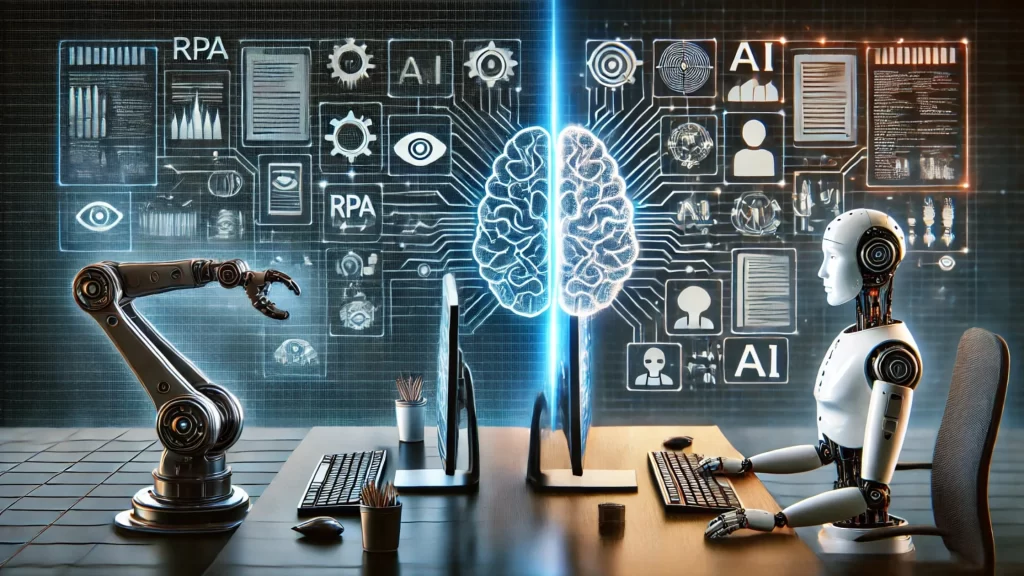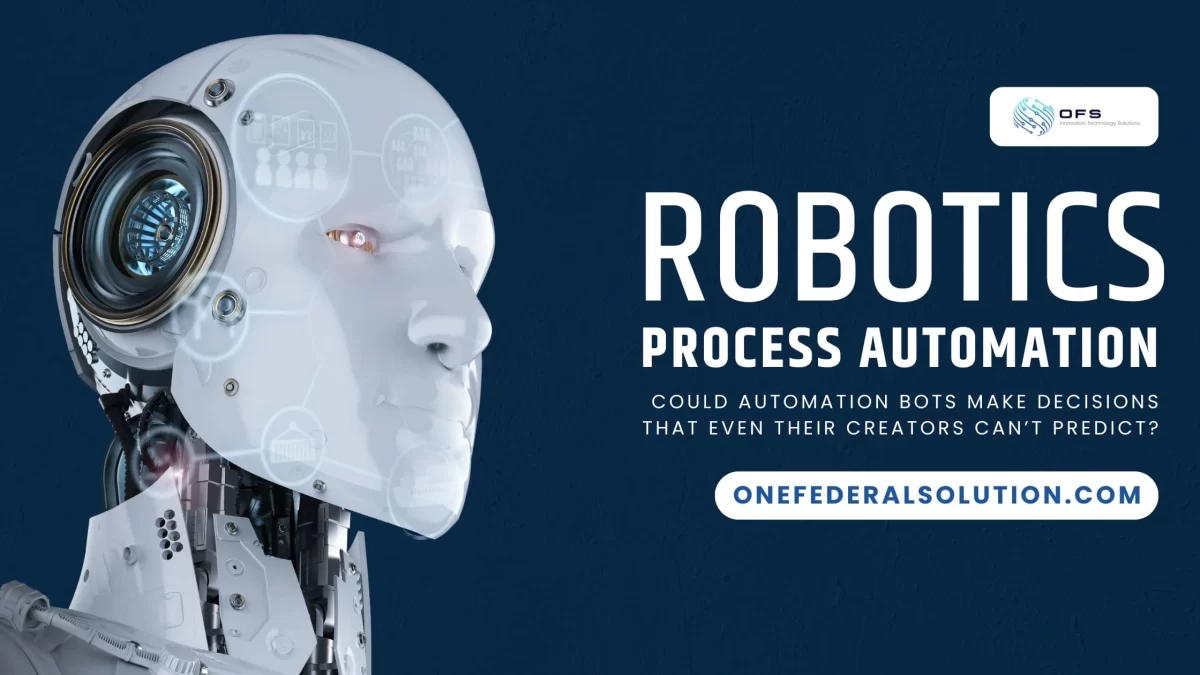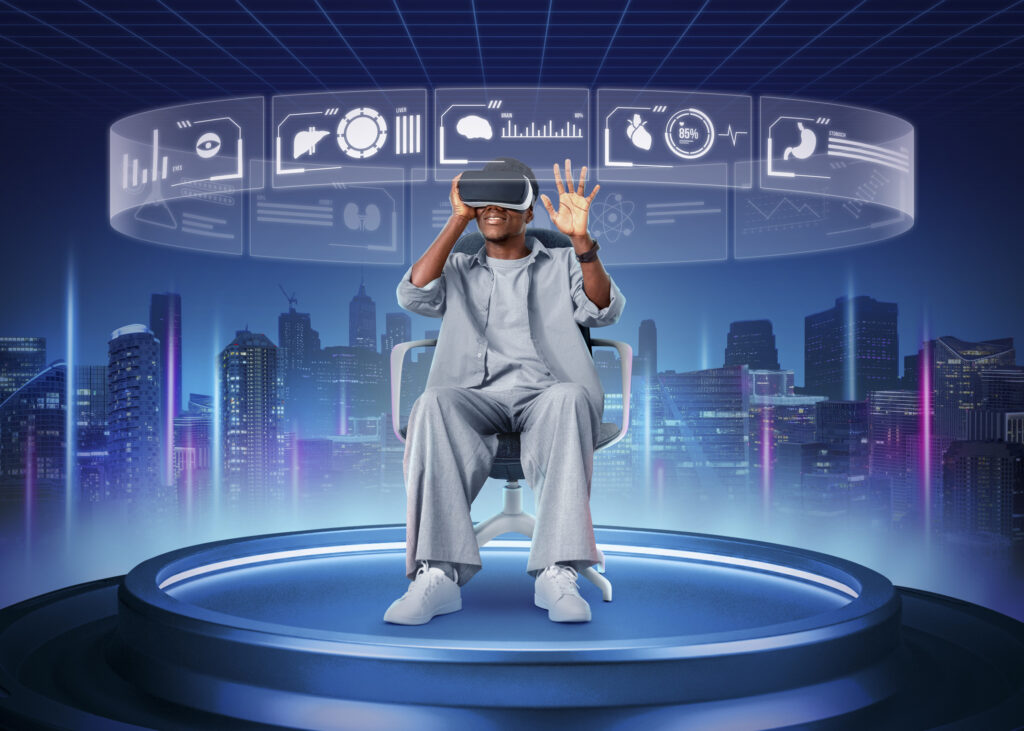Have you ever wished that tasks like filling out forms, copying data, or handling big piles of paperwork could just magically get done without lifting a finger? This is exactly what Robotic Process Automation, or RPA, can do for businesses. But what is RPA, and why should your business care about it? Don’t worry—we’ll break it down in simple terms so everyone, can understand.
What is Robotic Process Automation (RPA)?

Also known as software robotics, robotic process automation automates repetitive tasks that humans typically perform.
Think of it like a team of tireless, invisible robots working on your computer. These aren’t the kind of robots with arms and legs—they’re software programs that follow instructions to complete repetitive tasks quickly and accurately. Robotic Process Automation, or RPA, is like teaching a robot how to do boring, repetitive tasks for you. These robots follow simple instructions to get the job done quickly and without making mistakes.
For example, think about things like sorting emails, transferring information from one program to another, or organizing files. These are jobs that take up a lot of time but don’t need much thinking. That’s where RPA steps in—it takes care of these tasks for you so people can focus on more creative, important work.
How Does RPA Work?
Imagine you showed someone step-by-step how to perform a task. RPA bots learn the same way. They “watch” how tasks are done on a computer once, and then they can do it all on their own. These bots don’t get tired, make mistakes, or need breaks. For instance, they can log into a system, copy data, paste it where needed, and handle everything just like a person would—but way faster.
These bots work by combining tools like APIs (which are like bridges helping different apps communicate) and scripts that mimic human actions. Think of it as giving directions to a robot—it follows your rules without question. This makes tasks like entering 1,000 names into a database something that takes minutes instead of hours!
Is RPA the same as artificial intelligence (AI)?

RPA and AI are not the same thing, but when used together, they can do amazing things for businesses.
Robotic Process Automation, or RPA, is similar to a robot that can perform repetitive tasks, such as transferring data or completing forms, by following easy instructions. Artificial intelligence, or AI, is similar to a computer’s brain in that it aids in learning and decision-making, such as comprehending speech or images.
When RPA and AI work together, robots can do much more! They can understand things like messy data, read documents, recognize pictures, and even talk with people in chats. AI helps the robots think and learn better
, so they can do even more tasks that need understanding and thinking.
RPA vs. Business Process Automation (BPA)
RPA and business process automation might seem alike, but they are quite different. RPA is like a skilled worker performing specific, repetitive tasks, while BPA acts more like a project manager, improving and streamlining entire processes.
BPA is all about upgrading and optimizing the whole workflow, from start to finish. On the other hand, RPA handles smaller, repetitive tasks within that workflow. For example, BPA can redesign your whole customer onboarding process, while RPA can take care of things like entering data or processing documents as part of the larger system.
Why is RPA Such a Big Deal for Businesses?
For organizations and businesses, time is money. If you spend hours doing simple office tasks every day, you’re wasting valuable resources. Here’s how RPA can make life easier for businesses:
- Cost Savings
Bots don’t need salaries, vacations, or coffee breaks. They can handle a lot of work at a fraction of the cost, which saves businesses money. - Improved Employee Happiness
Imagine how employees feel when they don’t have to do boring, repetitive jobs all day. Freed from these tasks, they can work on things that require creativity or critical thinking, making their jobs more enjoyable.
- Faster and Better Customer Service
Bots can work 24/7 to handle customer requests, like verifying information or processing forms. This means customers don’t have to wait long for help.
- Accurate and Compliant Work
Unlike people, bots don’t make typos. They follow regulations precisely as they are programmed, which is crucial in sectors with strict laws, such as banking or healthcare.
- No Need to Change Your Computer Systems
RPA doesn’t require complicated changes to your existing software. Bots work with what you already have, making them easy to set up and use.
RPA in the Real World—Use Cases

RPA is already being used all over the world in many industries. Here are a few examples of how it’s making a difference:
- Banking and Financial Services
Banks use bots to handle things like opening new accounts, processing loan applications, and even spotting unusual transactions to prevent fraud. This makes banking faster, more secure, and less prone to human error. - Insurance
Filing and approving insurance claims can be slow. Bots can speed up the process by collecting details, cross-checking them with policies, and automatically approving straightforward claims, which saves everyone time. - Retail
Online shopping is booming, and bots help behind the scenes by managing inventory, tracking shipments, and even answering customer questions. - Healthcare
Doctors and nurses are busy saving lives, not filling out forms! RPA bots help by keeping patient records updated, processing insurance claims, and even sending appointment reminders.
Challenges of RPA
Even though RPA is fantastic, it’s not all sunshine and rainbows. Businesses may face a few hurdles when adopting it:
- Cultural Changes
Some employees might worry that bots will replace their jobs. But in reality, bots don’t take away jobs—they help people focus on more meaningful work. Educating employees and encouraging innovation can help everyone adapt. - Scaling Up
Implementing RPA is easy at first, but things can get tricky as businesses expand their automation programs. Keeping up with new regulations or changes in software can require extra effort.
How to Implement RPA
Implementing Robotic Process Automation (RPA) can be simple if broken into manageable steps. Here’s a quick guide:
- Identify Repetitive Tasks
Look for routine tasks that require little creativity or decision-making. Maybe you are looking to extract information from your emails and attachments such as invoices, order details, or customer information
. - Consult the Team
Talk to everyone involved in the task to gather insights and suggestions. - Document the Process
Write down every step of the task, from start to finish. - Choose an RPA Tool
Research and pick the RPA software that fits your needs best. - Build the automation
Collaborate with IT or an RPA expert to create the automated process.
- Test Thoroughly
Run tests with all stakeholders to ensure everything works correctly. - Refine and Improve
Use feedback to tweak the automation for maximum efficiency. - Roll Out and Expand
Deploy the solution, monitor its performance, and look for more tasks to automate.
You may easily implement RPA and boost productivity throughout your company by following these steps.
Final Thoughts
Having a helpful companion who never sleeps or makes mistakes is what robotic process automation is all about. It facilitates staff life, increases customer happiness, and helps businesses save money. While challenges like scaling and adapting to cultural shifts exist, the benefits far outweigh them.
If you’re part of any organization—big or small—RPA can help you work faster and smarter. Don’t get left behind as the world embraces the future of automation!




